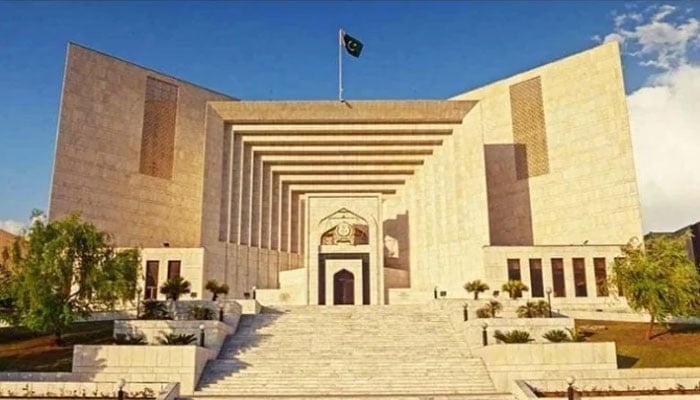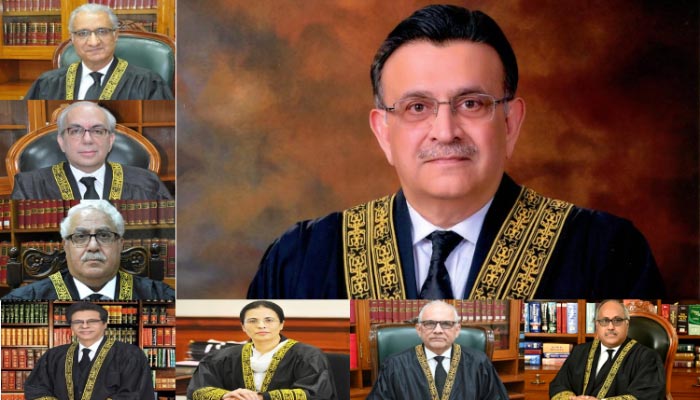CJP Bandial links SC bill to freedom of judiciary
Eight-member SC bench serves notices to President Alvi, PM Shehbaz, the federation, bar councils and others
ISLAMABAD: Chief Justice of Pakistan (CJP) Umar Ata Bandial on Thursday termed cases on controversial Supreme Court (Practice and Procedure) Bill 2023 “important” as he served notices to President Arif Alvi, Prime Minister Shehbaz Sharif and others during the hearing of petitions challenging SC bill.
An eight-member larger bench of the Supreme Court took up four petitions challenging a bill seeking to curtail the powers of the chief justice of Pakistan (CJP) amid strong criticism from the ruling alliance — that has rejected the "controversial bench" hearing the pleas.
The bill, titled the Supreme Court (Practice and Procedure) Bill 2023 — aimed at curtailing the powers of the CJP to take suo motu notice in an individual capacity — was initially passed by both houses of parliament and sent to the president for his assent. However, the president sent it back, after which it was passed during a joint session of the parliament.
Hours before the hearing began, the coalition parties released a joint statement rejecting the bench stating that the pleas were admitted even before the completion of the legislative process.
The bench is headed by CJP Bandial and comprises Justice Ijaz ul Ahsan, Justice Munib Akhtar, Justice Sayyed Mazahar Ali Akbar Naqvi, Justice Muhammad Ali Mazhar, Justice Ayesha Malik, Justice Syed Hasan Azhar Rizvi and Justice Shahid Waheed.
The four separate petitions — asking the top court to set aside the bill — were filed by Raja Amer Khan, Chaudhry Ghulam Hussain, Mohammad Shafay Munir, and Khwaja Tariq Rahim among others, under Article 184(3) of the Constitution.
Today's hearing
At the outset of the hearing, the petitioner's lawyer Imtiaz Siddiqui started his arguments by saying that the case was very important in the prevailing situation.
The counsel said that differences widened between the parties after the Qasim Suri case and the political crisis increased after the National Assembly was restored.
"The federal government and the Election Commission of Pakistan (ECP) are not willing to hold elections which is why the court had to take suo motu notice," Siddiqui said.
The lawyer said that the problems were created following the court's directives to implement the constitution after which the judges and judiciary were criticised.
"The government's ministers and members of parliament are responsible for this," the lawyer said, adding that the proposed legislation interfered with the independence of the judiciary.
He said that the president's objections to the bill were not examined. Siddiqui added that the bill will become law after the approval of a joint session of the parliament in 10 days.
The lawyer mentioned that the Supreme Court makes its own rules under Article 191.
Explaining the important points of the bill, he said a three-member committee will decide on the formation of benches and taking up suo motu notice under the bill, the lawyer said.
"It is illegal for the cabinet to endorse a bill. Presenting and approving a bill in the cabinet are administrative matters," he noted.
He further said that the bill is not pending but is a proposed act, adding that it would become law in 10 days whether or not the president approves it.
Lawyer Siddiqui said that the Supreme Court can nullify the bill passed by the parliament.
"The Supreme Court does not exist without the chief justice and by limiting his powers, the judiciary's independence and other judges will be affected," remarked the lawyer.
He further added that the CJP and the judges' powers cannot be curtailed. Siddiqui added that the apex court can review the steps taken by the state's institutions.
"The court can review the bill once it is passed and even before it is approved by the president," he insisted.
Siddiqui observed that the parliament is bound to obey the orders given by the Supreme Court.
"The Supreme Court's rules under Article 191 cannot be amended by the parliament," he said.
In his response to the lawyer, CJP Bandial said: "According to you, the freedom of judiciary is a basic right which enjoys complete security by the Constitution."
He added that similarly, "you [Siddiqui] think that the judiciary also has constitutional security just like the parliament and executive."
Siddiqui replied that the president is a symbol of unity of the state of Pakistan and his position as the head of state is not just ceremonial.
"The president directed to review the bill once again; however, the bill cannot be amended after the approval of the assembly," he said, adding that the process of legislation is considered done once it is passed.
Advocate Siddiqui requested the court to stop the bill from becoming law and said the Ministry of Law should be restrained from notifying the proposed act as a law until the verdict is announced.
At this, the chief justice questioned whether constitutional violation in this matter took place or not.
Siddiqui further mentioned that there is a right to appeal under the proposed bill.
"How can an appeal be filed if a 10-member bench hears a case? Can junior judges hear the appeal against the verdict announced by senior judges?" he questioned.
At this, CJP Bandial replied that all the judges in the court are equal.
Advocate Siddiqui said that the stages before the approval of the bill should also be taken into consideration in this case.
"What do you want from the court regarding this current case?" questioned Justice Akhtar.
To this, the lawyer said that the Supreme Court (Practice and Procedure) Bill, 2023 should be declared unconstitutional.
CJP Bandial remarked that this is an important case as the matter regarding the judiciary's independence was raised.
"We have the utmost respect for the parliament; however, the court wants to examine the legislation," he stated.
The chief justice said that the court will try to schedule the next hearing as soon as possible when fellow judges are available.
Later, the Supreme Court issued notices to the parties in the petitions filed against the bill clipping CJP's powers including Pakistan Bar Council and Supreme Court Bar Association.
The apex court also issued notice to the attorney general for legal assistance.
Later, the Supreme Court issued notices to the parties in the petitions filed against the bill clipping CJP's powers including Pakistan Bar Council and Supreme Court Bar Association.
The apex court also issued notice to the attorney general for legal assistance.
The court adjourned the hearing till next week and the order of the case will be issued after some time.
The bill
The Supreme Court (Practice and Procedure) Bill, 2023 aims to give the power of taking suo motu notice to a three-member committee comprising senior judges, including the chief justice. It also aims to have transparent proceedings in the apex court and includes the right to appeal.
Regarding the formation of benches, the bill states that every cause, matter or appeal before the apex court would be heard and disposed of by a bench constituted by a committee comprising the CJP and the two senior-most judges. It added that the decisions of the committee would be taken by a majority.
Regarding the apex court's original jurisdiction, the bill said that any matter invoking the use of Article 184(3) would first be placed before the committee.
The bill says that if the committee is of the view that a question of public importance with reference to the enforcement of any of the fundamental rights conferred by Chapter I of Part II of the Constitution is involved, it shall constitute a bench comprising not less than three judges of the SC which may also include the members of the committee, for adjudication of the matter.
On matters where the interpretation of the Constitution is required, the bill said the committee would compose a bench comprising no less than five apex court judges for the task.
Regarding appeals for any verdict by an apex court bench that exercised jurisdiction under Article 184(3), the bill said that the appeal would have to be filed within 30 days of the bench's order for a larger SC bench. It added that the appeal would be fixed for hearing within a period not exceeding 14 days.
It added that this right of appeal would also extend retrospectively to those aggrieved persons against whom an order was made under Article 184(3) prior to the commencement of the SC (Practice and Procedure) Bill, 2023 on the condition that the appeal was filed within 30 days of the act's commencement.
The bill additionally said that a party would have the right to appoint its counsel of choice for filing a review application under Article 188 of the Constitution.
Furthermore, it states that an application pleading urgency or seeking interim relief, filed in a cause, appeal or matter, shall be fixed for hearing within 14 days from the date of its filing.
The bill said that its provisions would have effect notwithstanding anything contained in any other law, rules, or regulations for the time being in force or judgement of any court, including the Supreme Court and high courts.
-
Security forces gun down 30 terrorists in multiple IBOs in KP: ISPR
-
MQM-P calls for new province in Sindh
-
US report validates Pakistan military edge over India: PM
-
Banned TTP poses serious threat to Pakistan security: UNSC panel
-
CM Afridi clarifies remarks on by-poll after ECP requests army deployment
-
Dubai sees 3.2m Pakistani passengers in 2025 as airport sets new milestone
-
Security forces kill 23 Indian proxy terrorists in KP's Kurram
-
Pakistan to construct island to boost oil exploration: report













